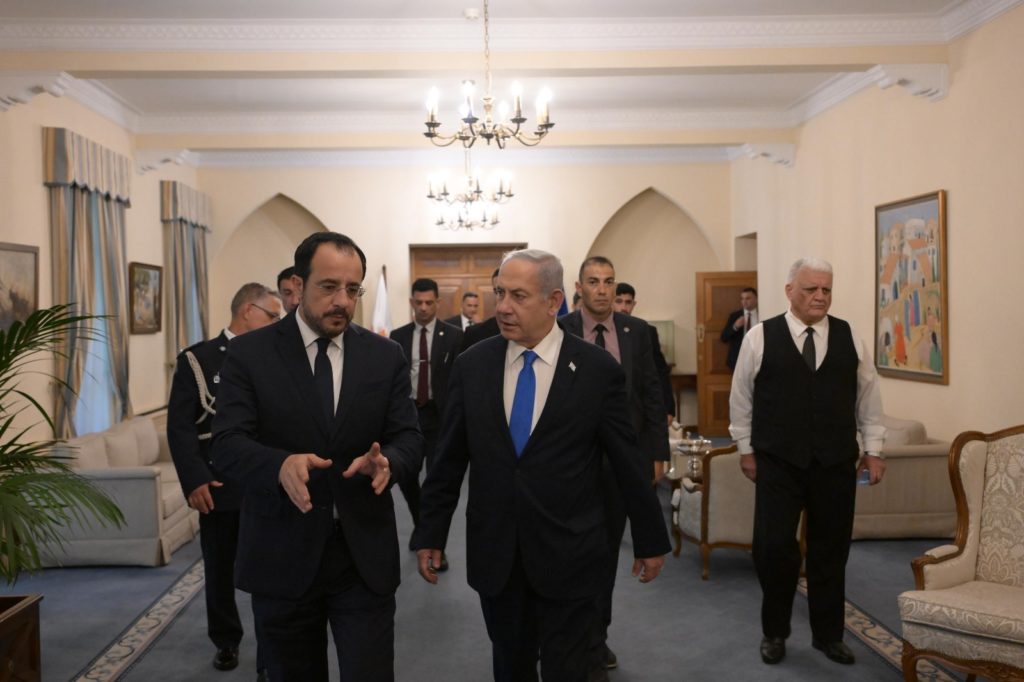
Israel and Cyprus are ancient civilizations that share a modern advantage: natural gas resources. They also share a common challenge: How to distribute those resources to Europe. So as part of Israeli Prime Minister Benjamin Netanyahu’s latest trip to Cyprus—which includes meeting with Greek leadership—exporting natural gas is one of several cooperation topics on the agenda.
“On the issue of energy, there are decisions that we will have to make soon as a result of our having carried out another revolution, the extraction of natural gas from the sea,” said Netanyahu on Sunday in comments ahead of his trip. “…This provides us not only with the natural gas needs of the State of Israel, but also the ability to produce for Europe. We have several routes for production.”
In the comments published by Israel, Netanyahu said the options in focus would be a natural gas pipeline or a liquefaction plant in Cyprus, which he said “would allow us to produce a massive amount of gas for Europe, which will also fill the state coffers.”
An article in Politico in June highlighted the various regional political challenges around delivering natural gas from Cyprus and Israel to Europe. This includes tensions with Turkey—viewed as a threat by Greece and the Greek side of Cyprus that rivals the Turkish-backed side of the island—and disputes with Turkey over natural gas ownership and how the lucrative product could be shipped to Europe. At the time, the situation was at an impasse with discouraging expectations of the deadlock breaking.
In joint remarks after Sunday’s initial meeting with Cypriot President Nikos Christodoulides, Netanyahu limited what he shared regarding the details of natural gas discussions, while indicating no firm resolution would come in this trip. “We’re also talking about various options for cooperation in natural gas. We’ve been very fortunate, both our countries, in discovering reserves of gas. And we’re talking about how we could cooperate in this,” said Netanyahu in comments posed by Israel. “This is something that we’ll continue in the coming months.”
While the natural gas opportunity has hit snags, Netanyahu is also discussing other potential ways to leverage Israel and Cyprus’ location to bring products to Europe, including electricity. He said they are discussing an “electrical connector” that would link Cyprus and Greece to Europe with Israel and “possibly to countries to our east.”
“And that gives us the ability not to be—forgive the expression—islands. I’m not sure being an island is so bad. We in Israel often even wished that we’d been an island. But you certainly don’t want to be an energy island,” said Netanyahu in Sunday’s joint session with Christodoulides. “You want to be connected to other sources of power that can allow a more optimal use of power. Or give you power when there is a failure in your own country. That is something that we’re discussing seriously and we hope to achieve.”
Another potential way to use Israel and Cyrpus’ location as a bridge for resources from the Middle East and beyond is in the realm of infrastructure. Netanyahu spoke of a potential “Asia-Middle East-Europe corridor” that could span from Asia through the Arabian Peninsula, through Israel, Cyprus and on to Europe.
“That’s going to happen as part of the extension of the Abraham Accords, and possibly, obviously possible normalization with other countries in the region,” said Netanyahu, who continues to push for expanding the Accords’ peace deal with more Middle Eastern nations.
As an example of infrastructure that could traverse the continents via Israel, he listed fiber optic connection. “That’s the shortest route. It’s the safest route. It’s the most economic route.”
Netanyahu also listed a number of other cooperative opportunities with Cyprus and Greece, including tourism, security, science and more. As part of his comments with Christodoulides, Netanyahu celebrated the three nations’ “common values, common history.”
“I mean, Western civilization is the result of basically Greek culture and Judaism fused together. And that, our commitment to democracy and our common interest in the region—to fight radicalism, to fight terrorism, to fight those who don’t share our worldview and want to destroy our world—the combination of these things has made this association, this partnership, real,” said the Israeli leader. “And it becomes stronger with each passing year.”
(By Joshua Spurlock, www.themideastupdate.com, September 3, 2023)
